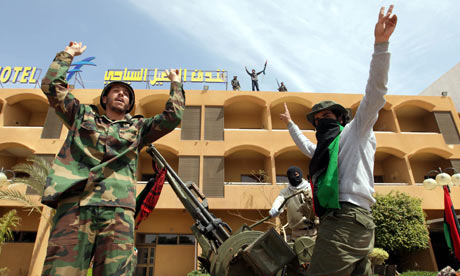The shape of Libya's 'better future' remains elusive
How can western allies define a 'better future' for Libya, while there is still fighting and the outcome is so uncertain?

It seems odd to be making decisions about a country's future without the involvement of its current government, however despised that government may be. But the Libya crisis is packed full of such anachronisms. It's a war of choice – except officially, according to the US and Nato, it's an internal conflict. It's about protecting civilians, says the UN, except the heavily armed "civilians" of Benghazi and eastern Libya are now marching on Tripoli. In theory it's not about dethroning Gaddafi – but in reality it most certainly is.
Tomorrow's one-day international conference in London, dedicated to "a better future for the people of Libya", is a heavyweight affair. David Cameron's guest list includes Hillary Clinton, leaders of the UN, Arab League and African Union, about 35 foreign ministers – and the rebels' transitional council. Muammar Gaddafi, Libya's long-time ruler, and his representatives are not invited. This is because Gaddafi's rule has been deemed "wholly illegitimate" by western leaders – another legal and political oddity.
A principal reason for this five-star turnout is a four-letter word hovering like a dread spectre over the whole Libyan enterprise: Iraq. "You may recall the last time the US and its allies used military force to overthrow a hated Arab dictator," said James Traub in Foreign Policy. "The resulting vacuum was quickly filled by anarchic looting, murderous rivalries and, ultimately, civil war … It's a mistake we wouldn't want to make again." If they agree on nothing else, conference participants agree on that.
But how to define, and how to achieve, that "better future" for Libya, when the fighting is still in progress and the outcome deeply uncertain? "No one can know what will come next, much less what will come after that," said Richard Haass of the US Council on Foreign Relations. Recent history in Afghanistan and Bosnia as well as Iraq suggested success, however defined, would be expensive and hard-won.
One possible scenario backed by Turkey – that Gaddafi agrees to a genuine ceasefire and negotiations but remains in power (for now at least) – is a potential nightmare for Cameron, Barack Obama and France's Nicolas Sarkozy, the main western protagonists. None of these leaders has spelled out what they would do in such circumstances. But UN resolution 1973 provides no basis to insist Gaddafi stand down and they have no direct means to compel him.
Italy, the former colonial power, is pushing a variant of this theme ahead of the London meeting with possible backing from Germany. It proposes a political deal including a quick ceasefire, dialogue between rebels and tribal leaders, and voluntary exile for Gaddafi.This depends on Gaddafi doing the decent thing, an optimistic idea.
Another, more likely, scenario – that Gaddafi is toppled by his own people – raised a host of other unknowns, said Jonathan Eyal of the Royal United Services Institute. "The Libyan intervention will not be deemed a success until Gaddafi has been overthrown by his own people, preferably with a minimum of violence," he said.
But Gaddafi was not one to flee into exile. And in any case, his options were few. "No country wants him. He's a dictator with his back to the wall, with nothing more to lose. He'll go down fighting."
Little is known about the rebels' transitional council and the people who might subsequently run Libya, both in terms of their politics and their Islamist and tribal leanings. Eyal warned that a possibly violent reckoning with pro-Gaddafi forces was all but inevitable, should the rebels enter Tripoli. "We succeed in stopping one massacre [in Benghazi]. Now we may have to stop another," he said.
The council contained a surprising number of "recycled democrats" with blood on their hands from their time spent serving Gaddafi, Eyal said. "But the west will have to deal with them. It's the same problem we had in Serbia after the fall of [Slobodan] Milosevic."
Eyal said he did not believe a post-Gaddafi Libya would split apart or descend into internecine warfare. But it would present costly, long-term security, humanitarian and diplomatic challenges for which western countries were probably unprepared. "A new Libyan government cannot be a centralised authority, power will have to be more devolved. It will be a more disjointed country altogether. And whatever happens, there will have to be a redistribution of oil revenues between east and west" – which might be a shock to western oil companies.
Conference participants may touch on some of these issues but they will not resolve them. The key question remains: when can western countries disengage? Now and for the foreseeable future, there is no answer.
(source:.guardian.co.uk)
=========================================================

No comments:
Post a Comment